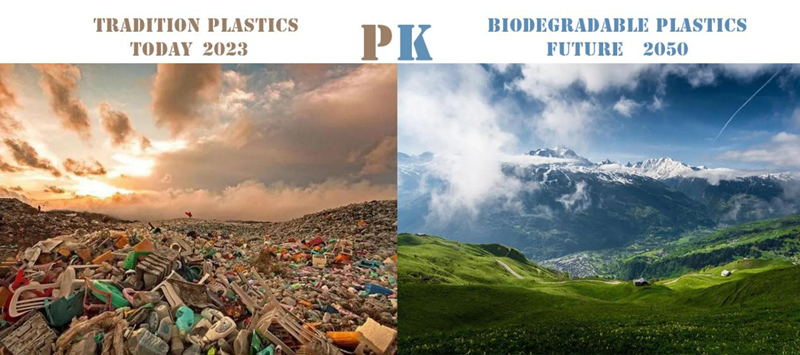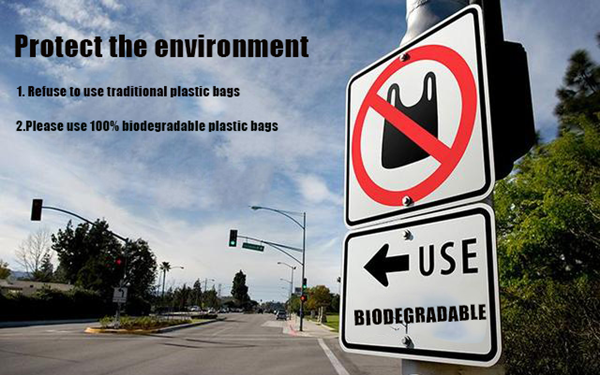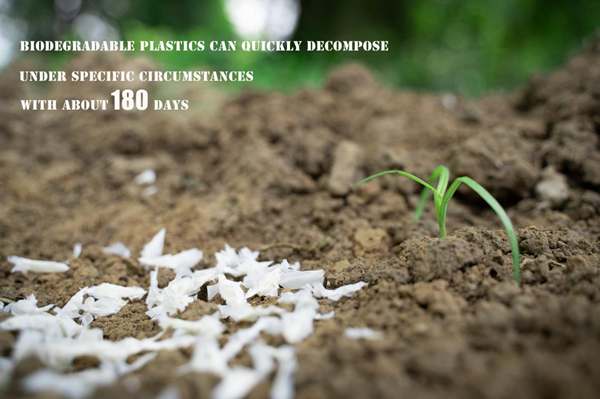Is biodegradable good for the planet?
YES! Of course! Biodegradable is good for the planet.

Let's discuss together 10 advantages of biodegradable plastics:
No Dangerous goods will be released after decomposition
Nowadays, we produce more plastic waste than ever before in human history. These garbage are entering our oceans and even polluting our drinking water. Scientists estimate that by 2050, there may be more waste plastics in the sea than fish, and by that time the Microplastics contained in tap water will be as high as 80%. Researchers at the University of Bath have created a plastic that uses only sugar and carbon dioxide, thus eliminating the need for Petrochemistry products and carbon dioxide emissions for refining polycarbonate. Plastics like this will naturally decompose and only release the gases that produce them back into their original environment.
When using biodegradable plastics instead of traditional plastic products, there is less greenhouse gas emissions into the atmosphere. We consume over 100 million tons of plastic annually, which means that a standard production ratio of 5:1 indicates that this industry generates 500 million tons of carbon dioxide entering our atmosphere every year. This number is equivalent to the annual emissions of 19 million cars.
If we recycle plastic every year, our net carbon savings alone would be as high as 30%, while some researchers believe it can be as high as 80%. Switching to biodegradable plastics will help further reduce greenhouse gas emissions generated by the industry, although achieving this transformation will require initial financial costs.
After the formation of plastic, traditional products will preserve its carbon. When you dispose of them, they begin to decompose in some way, and then the gas is released into the atmosphere. Due to the fact that biodegradable plastics do not always require CO2 during the manufacturing process, greenhouse gas emissions may never occur during the decomposition process. When they begin to decompose in the environment, bacteria in the soil begin to consume these components. In this way, we need to manage less waste and reduce the likelihood of pollution for each biological community.

If you throw a bucket filled with traditional plastic into a landfill, then when the product begins to decompose, you will release methane and other forms of pollutants. Due to the fact that these pollutants usually do not have biodegradable substances, we can immediately enjoy the benefits of no hazardous releases.
Plastics make our lives easier in many ways, but they may also contain potentially dangerous products that may also pose a threat to our health. Bisphenol A (BPA) is a key component in the manufacturing of resins and plastics. In the past, this substance was used for plastic tableware, water bottles, and sports equipment. Phthalate softens plastics and is often added to PVC. Both are considered endocrine disruptors and harmful to the human reproductive cycle. Biodegradable substances eliminate the use of these substances.
Although biodegradable plastics have slightly higher costs in the production cycle, we actually consume less energy. We no longer need to search for, obtain, and transform hydrocarbons to manufacture plastic items using this technology. This means that we burn fewer fossil fuels, consume fewer fossil fuels in the manufacturing process, and release fewer pollutants. Because of this energy saving, the long-term cost of using biodegradable products may be lower than that of traditional plastics, especially if the cost of cleaning up Plastic pollution is added to this calculation.
Plastic accounts for approximately 13% of our current waste stream. This number is approximately 32 million tons of waste per year, of which only 9% is used for recycling programs. The rest enters landfills and other waste treatment projects. When the factory has the correct composting equipment to manage biodegradable plastics, we can decompose the products within 18 to 36 months, depending on the method used.
Traditional plastic products come from the heating and treatment of oil molecules, which turn them into useful polymers for industry. In the United States, approximately 3% of oil is consumed by the amount of plastic consumed annually. Biodegradable substances come from products such as switchgrass or corn, which means that we can use industrial oil for transportation energy or heating needs.
We do not need to use biodegradable plastics to manufacture new products, in order to create environmental benefits through this technology. Once natural materials are converted into polymers, they can be used together with materials made from petroleum, thereby reducing the percentage of fossil fuels. When we manufacture this mixture, plastic products usually also have more strength.
In the United States, corn based plastics account for approximately 40% of biodegradable materials. When you compare polymers made from this crop with polymers made from crude oil, the energy required to manufacture biodegradable products with similar quality is reduced by 65%. In addition, greenhouse gases generated during the manufacturing process have been reduced by 68%.

Bioplastic are usually decomposable, which means that they will decay into natural materials and eventually be mixed into the soil harmlessly. When Corn starch molecules encounter water, they will slowly absorb water, expand, and decompose things into smaller pieces. Then, the natural bacteria in the compost container will digest it and produce something beneficial to the Earth.
